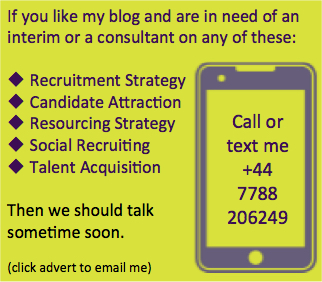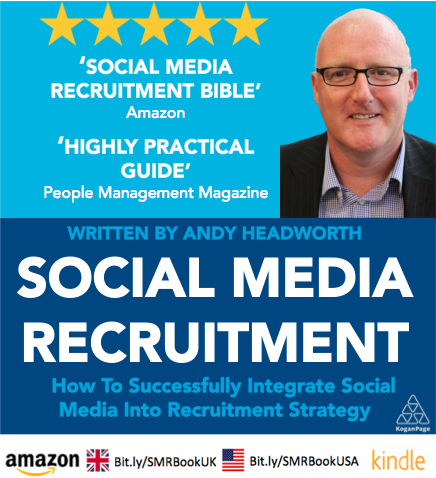How To Create Candidate Personas To Recruit Talent
Do you know what you are actually recruiting for? I don’t just mean a job title and a company name. I mean, do you really understand what talent you are looking for, what it looks like and where they are most likely to be found? Over the last couple of months, I have had the pleasure of speaking to and working with many recruiters across Europe, the US and Canada. As a starting point I asked them all this question, and worryingly always got a similar response from the vast majority of the recruiters present, and unfortunately it wasn’t very positive.
So, how can you find the talent you want to find if you don’t actually understand what you are actually searching for in the first place?
A process I go through with clients is to help them build candidate personas for the positions they are trying to find. This takes a little time and should involve more than one person creating them, but the objective is to find help you identify and source talent that you would not have found originally.
1. Job title and all the synonyms
Self explanatory this may be, but it still seems a mystery to many people. Every single company seems to have a different job title for similar roles. It is your responsibility as a recruiter to know them all - from all the companies that you are looking to recruit from. Then you need to factor in UGC (user generated content) as well, as we all refer to our jobs differently, not necessarily the way that your employer presents them on your job description. Ego’s play a large part in the need for synonyms! It isn’t what you think a candidate is, is it what they think they are!
Secondary: Job titles and synonyms of the ‘step-up’ candidates. These roles could represent people could potentially step up the the role, and with some development could do your target role. This is very relevant when you are searching for the very sought after skills, and are struggling to find them.
2. Where do they work
What are all the companies that employ people with all the job titles you have put together in #1. I did tell you it takes a little work! Some of you (and your clients) will have very specific (and biased) requirements here e.g. your top five competitors, only direct competitors etc. If that is the case then this will limit your selections - you absolutely need to try and push back on this and show them there are other relevant talent in the marketplace - just at different companies and maybe different industries.
3. What do they do
What do your target candidates actually do? Aside from the standard job description content, what do they use to do do their job - software, tools, programs, technologies etc. Then which skills do they need to use them? Rather than think about keywords here, try and figure about the descriptive text they may use when talking about them. So, for example while they not be a manager in title, they might still do the job - highlighted by using verbs like: ‘manage people’, ‘managing teams’ or ‘managing people’. Find the verbs that people use in their profiles/CV’s that they could use to describe their job.
4. Experience
What level of experience do they need - how many years? What do they need experience of? Industries, sectors, specific products, brands? Use the same approach as in #3 with the verb phrases.
5. Personal details
Age profiling is a sensitive and legal minefield which I am not going into, but certain roles require certain levels of experience to achieve them. You need to know that. Location is an obvious need for candidate information, but how well do you explore the relocation question? #2 might actually expose lay-offs or redundancies in areas you hadn’t thought of. These companies might be willing to help with relocation, or the individuals concerned consider moving for improving their career or job prospects. Too many recruiters just don’t ask the question. International mobility is a slightly more complex proposal to a candidate, but the answers may surprise you. Alternatively try countries that have favourable visa options with your country - like Australia and New Zealand with the UK.
Education is always an interesting question to ask. Are there specific universities/colleges you need to target because of the courses offered? Are there generic types of course offered across many other locations? Do you drill down any further into the course content? One common request in the UK for certain types of companies is that candidates must come from one of the ‘redbrick universities‘. Really? So there are no other alternatives? I always challenge that one! What about the need for a degree in the first place? Is it essential for the role?
The final part of the personal details, and for many the most important part - salary. There is one word that many candidates need to learn - reality! This could be a whole blog in its own right, but suffice to say this needs detailed attention when you are doing this aspect. You should know what the market is paying and demanding (if not you can find out easily enough), so when you get a new role that differs greatly, you can push back and challenge based on fact and knowledge.
6. Goals / Challenges
Based on your experiences and knowledge, what goals do these people have? What are their aspirations? You are obviously going to do some generalisations here, but based on conversations you will have had in interviews, exit interviews and with colleagues you should be able to start to understand the goals and challenges (career wise) of your target candidate audience. This will help you better understand how to try and identify and recruit talent. It may well be this is used for talent pipelining for the future or trying to better manage your workforce planning.
7. Values / Fears
What do your potential talent value in your industry, and conversely what do they fear? You need to know as it becomes a critical part of finding the right people. A simple but common example is the main management consultancies (you know who they all are). If you join their entry programmes to become a management consultant, you know that will be working long hours and likely in uncertain client locations. For some this lifestyle is not for them, so this knowledge makes it easier when approaching them, especially if your company is big on quality of life.
8. Marketing message
What are the marketing messages you are going to use to get their interest? Based on all of the above what will appeal to them? What are going to be your communication and engagement strategies to reach out and initiate the conversations you need to make happen? I bet you haven’t even thought of this!
9. Pitch
When you have initiated the dialogue - informally or formally - what is your pitch to your target audience? Why should they join your company? What will you offer? How will you meet their needs and overcome their fears? Will you meet their goals and satisfy all their personal needs?
10. Where are they?
Now you have all this great information, all you have to do is find them! Starting with the obvious places to search (like LinkedIn, Google and Facebook) you will by now (after doing #1 to #3) have a good idea where your target audiences could be found. They will likely have an online presence somewhere on social media, but equally there may well be a better way of finding them. Do they have offline meetings, networking events, conferences et? Use your comprehensive lists you have made to create some complex searches across social media sites. For example, remember that each of the search fields in LinkedIn’s advanced search can take 2000 characters, allowing you to build detail boolean strings (using OR, ” “, ( ) AND ) to make your searching more effective. (I will cover this in a later post).
I go back to my first point.
Do you know what talent you are looking for? I hope that this has explained my rationale for the question and why I consistently ask it to recruiters.
Cheeky plug 😉
Have you got a copy of my latest book yet? Social Media Recruitment, is now out in the UK and EU.
You can of course buy it on Amazon, where it is was the No.1 New Book Release in the Interview and Recruitment Category.












Pingback: How to create and implement a rewarding and innovative social recruiting strategy? Notes from the #RecHangout | The Recruitment Alliance()
Pingback: Best Recruitment Marketing Articles of the Week 5.26 to 5.29 - SmashFly Blog()
Pingback: Sirona » Twitter Is No Longer Optional For Recruiters And HR()
Pingback: Sirona » 7 Ways Social Media Can Help Build Your Talent Pipeline()
Pingback: 9 Fantastic Recruitment Blogs You Should Be Reading - Adrian Tan()